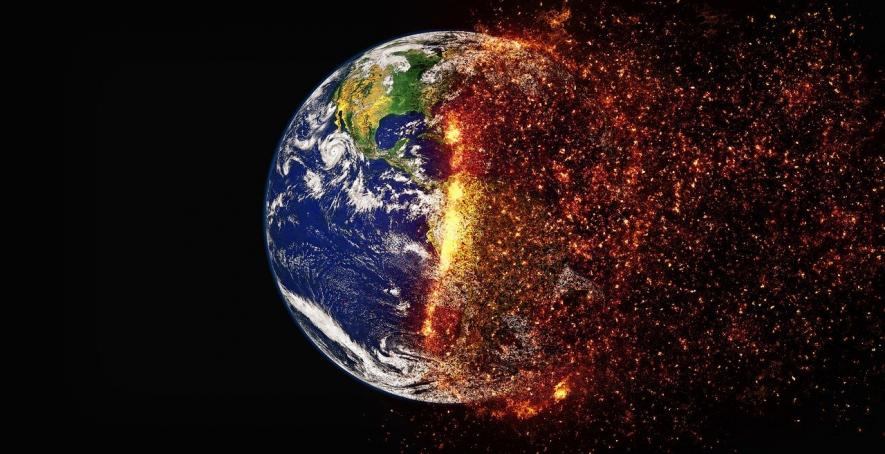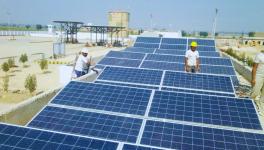14,000 Scientists Warn Humanity Will Face ‘Untold Sufferings’ if it Fails to Act on Climate Change

Representational image. | Image Courtesy: pixabay
Let us no more turn a deaf ear to the disastrous possibilities of the unabated climate change due to human activities, let us immediately tackle climate change, let us script policy change, if the human race is to avoid the ‘untold sufferings’ in the very near future—these are messages that have been given to all of us by scientists and researchers for quite a long time now. According to them, the time has come to act immediately, humanity does not have much time left.
Nearly 14,000 scientists have signed a new climate paper with a stark warning that the untold sufferings are waiting for the human race. This paper was published in the journal BioScience on 28th of July.
The BioScience paper, led by researchers from Oregon State University is an extension and an update of another research published in 2019. The 2019 paper declared a global climate emergency. The researchers considered 31 variables for analysis and based upon that they evaluated Earth’s vital signs. The variables that were included in the paper included greenhouse gas emissions, change in the surface temperature of Earth, loss of glacial ice, depletion of Amazon rainforest along with various socio-economic factors, for example global GDP (Gross Domestic Product), subsidies on fossil fuels, etc.
The recent paper published in BioScience found that Earth’s vital parameters have only deteriorated in the last two years. The findings were unsurprising, but it tells scores about the lack of efforts made in order to tackle climate change. The researchers found that 18 out of the 31 parameters considered for analysis have shown that they have touched all-time record high or all-time record low.
Greenhouse gas emissions have been unabatedly accelerating and now they have touched a record all-time high mark. On the other hand, the glacial ice thickness has reached the lowest point in the last 71 years, since the time the record keeping of the glacial ice thickness began.
It is to be noted at this point that greenhouse gas emissions were found to have levelled off in the year 2019 and a drastic, but very short-lived drop was seen in the early part of 2020, also the early half of the COVID-19 pandemic. These short term decreases in greenhouse gas emissions could not have curbed the overall worsening scenario of the emission and climate change.
The authors advocated for transformational system change to protect ourselves from the wrath of climate change. According to them, a short term decrease in human activity-related decreases in emissions does not matter enough. They wrote in the paper, “The updated planetary vital signs we present reflect the consequences of unrelenting business as usual. Even the effects of the unprecedented COVID-19 pandemic on some climate-related human activities were short lived. A major lesson from COVID-19 is that even colossally decreased transportation and consumption are not nearly enough and that, instead, transformational system changes are required, and they must rise above politics.”
However, there are some positive trends also, though very negligible in front of the dangers of climate change. The researchers found that there is record rise in the use of solar and wind energy and there is a trend of increasing divestments of money from the fossil fuel industry. Nevertheless, the picture of the future is bleak, which is accentuated by surges in disasters related to climate change like floods, storms, heat waves, wildfires.
The researchers also reiterated that planet Earth is also getting nearer to passing the critical tipping points. One really alarming example is the findings published in Nature recently, which suggests that the Amazonian forest may be transforming to a carbon source from a carbon sink, which will be nearly impossible to recover from. The authors argued that all the evidence boils down to one conclusion, and that is the future depends upon immediate and global efforts.
The authors also formulated a three-pronged ‘near-term policy’ approach that includes—a global implementation of a significant carbon price (energy and economy), a phase out and an eventually banning the fossil fuels, and the development of strategic climate reserves to strictly protect and restore natural carbon sinks and biodiversity throughout the world.
Get the latest reports & analysis with people's perspective on Protests, movements & deep analytical videos, discussions of the current affairs in your Telegram app. Subscribe to NewsClick's Telegram channel & get Real-Time updates on stories, as they get published on our website.
























